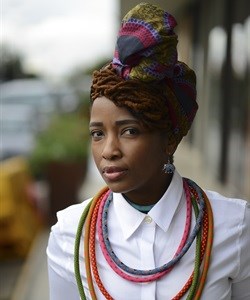
Related
Top stories


Marketing & MediaCammy Msimango on finding her footing in South Africa’s fast-moving digital newsroom
Esther Tomorrow, MDNTV 1 hour




More news









Tshabalala, who has 15 years' editorial experience having started her career at Fairlady, will be taking over the editor role from Brenda Nyakudya.

 What will your first order of business be?
What will your first order of business be?
Tshabalala: It’s been a decade since The Afropolitan magazine first hit shelves and in that time the country, and the world, has changed quite considerably. In 2006 there was no Instagram or Snapchat, the world has become a smaller place because of social media. My editorial goal is to update the look of the magazine by doing small cosmetic changes so we reflect the future and our reader even more. The magazine already has great editorial pillars and as they say, “if it ain’t broke, don’t fix it” and I don’t intend to change, I intend to add to what is already a good product. That said though, these days communities are created and harnessed largely through social media so The Afropolitan magazine will be upping the anti when it comes to our social media strategy.
 What is your core strategy as editor of Afropolitan?
What is your core strategy as editor of Afropolitan?
Tshabalala: My approach is rather simple; we need to consistently provide content that reflects The Afropolitan reader’s lifestyle needs and aspirations; to consistently produce content that solidifies the magazines pillars and to use new media resources (like social media, newsletters and lifestyle events) to make sure the magazine is constantly in conversation with our readers. The Afropolitan magazine is already a great product and my mandate is to make sure that we keep doing what we promise with each issue, and that’s to be the ‘signature of African sophistication’.
 What is your definition of an Afropolitan and who are your core readers?
What is your definition of an Afropolitan and who are your core readers?
Tshabalala: At the risk of sounding incredibly trite, I would say someone like me. I grew up in Meadowlands and Soweto, went to a Model C school in high school and found myself working in Cape Town for Fairlady magazine at the age of 20. I’m an urban citizen but I’ve had to straddle two worlds which means both culture and my career are equally important to me. The Afropolitan reader is proud of their African roots but lives a cosmopolitan lifestyle, they’ve worked hard for the luxuries they now enjoy but leaving a great legacy is just as important to them. It’s not just about acquiring wealth, it’s about celebrating the great strides black people have made (our readership is 95% black). We have an almost equal male and female split with a slightly higher number for our female readership.
 The biggest trend in your industry?
The biggest trend in your industry?
Tshabalala: The merging of new media (that is blogging, social media, etc) with time-tested media ideals has been the biggest trend and will probably be for years to come. Social media in particular has changed the way stories are tackled in newsrooms. I often say that these days pitching a story is about more than just a good idea, it’s about thinking of the lifespan of the article. How long can it capture the reader’s attention? Simply duplicating content online doesn’t work anymore. The story has to have a unique angle on every platform (using the magazine’s behind the scenes content for a Youtube channel for instance).
 What is your main business challenge?
What is your main business challenge?
Tshabalala: Staying relevant to your reader in a time where they can access almost everything they desire (from how to decorate their houses using the Houzz app to curating their own lifestyle content via Pinterest) is becoming an increasingly perilous balancing act for magazines and newspapers, in particular. But at the risk of sounding dangerously naïve, I do believe that print will rise to the occasion. There are rules that we need to stick to in media, for the sake of the law and the constitution, so where new media treats news with reckless abandon, old media rules can guide. In essence, the two can serve each other well if used properly.
 Most important attribute needed to do your job?
Most important attribute needed to do your job?
Tshabalala: You mean besides nerves of steel! I would say the ability to trust your instincts is the one thing every editor must have. Being able to spot a good idea and knowing how to turn that into a great story that will appeal to readers involves you having an instinct for what will work, it’s alchemy, there’s no formula so if you don’t trust yourself, you’ll fumble and make rookie mistakes.
 What inspires you?
What inspires you?
Tshabalala: Being able to curate content for people who look like me, who understand my challenges but have the same lifestyle aspirations I have (which at the moment include a fantasy of enjoying a vintage bottle of bordeaux at the Chateau Margaux vineyard in the south of France!) is a total honour for me. And because The Afropolitan magazine is not a commercial product we can take risks, be controversial (I’ve just recently wrote a controversial book called The Way I See It!) and most editors will tell you that creative licence is what makes us excited.
 Tell us something about yourself not generally known?
Tell us something about yourself not generally known?
Tshabalala: I have terrible habit of talking to myself. When you first interact with me you will find it disconcerting and mildly peculiar (apparently it’s a sign that perhaps your sanity is starting to leave you) but after a while you get used to it. I surely do hope people don’t think I’m insane though! *laughter*
 What's at the top of your bucket list?
What's at the top of your bucket list?
Tshabalala: So much! But I’ll just count five things for now: 1) to finally see the sphinx and pyramids in Egypt 2) to go to a Beyonce concert 3) own a Gerard Sekoto original artwork 4) meet and hopefully have some tequila cocktails with Oprah Winfrey and lastly 5) go to the Met Gala and be dressed by Public School for DKNY!
